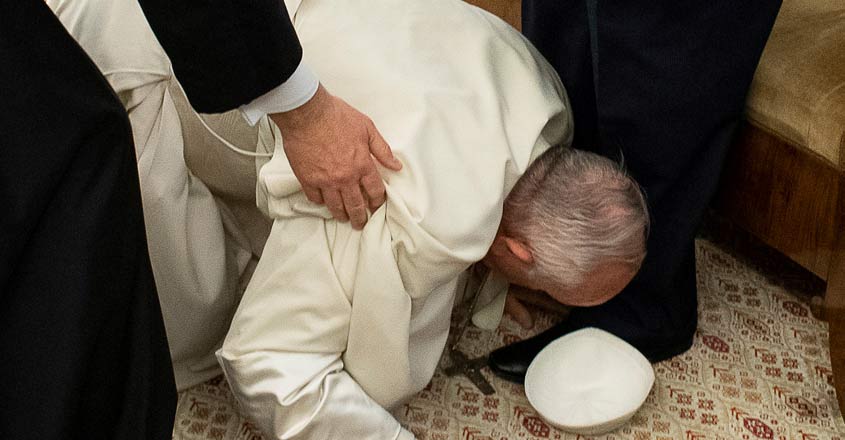
Lk. 22:14-23:56
“Become who you are.” (Friedrch Nietzsche) Today we celebrate the Palm Sunday and entering into the commemoration of the most significant events of our faith journey. Liturgy of the day introduces us to the celebration of the Holy week by providing the entire passion narrative for our reading and reflection. All of us are born to live but Jesus was born to die. By dying for us, He lives in each one of us. The passion narrative begins with the Passover celebration of Jesus along with His disciples. This can be considered as the most notable event in the life of Jesus. He instituted the sacrament of the Holy Eucharist, wherein, he shared His own body and blood mystically with his disciples for the expiation of our sins so that ‘we may have life and life in all its fullness.’ (Jn. 10:10)
Why then the institution of the Holy Eucharist became a most remarkable event in the passion narrative? Because all the other events that follow are an expression of this unfathomable love of Jesus, wherein Jesus becomes who He is… In order to live the sacramentality of the Holy Eucharist, we need to cultivate a servanthood mentality in our life. When the disciples quarreled with each other to discern who is the greatest among them? Jesus sets an example for them by washing and kissing their leg, normally a servant is expected to do this gesture of service in the Jewish culture. By performing this act, He taught them that first lesson to become a Eucharist is to inculcate an attitude of service towards our fellow brethren.
The second criterion is to be a man of prayer who always seeks the will of Father and gaining strength to fulfill it. It is his Gethsemane experience wherein He experienced intimacy and communion with the Father that strengthened Him to face his intense moments of suffering and temptation. He demanded from his disciples the very same when he told them to keep awake and pray; but they failed miserably. As a result, they could not be present with their master, instead abandoned Him and ran for their life.
Finally, to become a Eucharist we need to take up our own cross. It is this journey that made Jesus a self-gift to others. He found meaning in living and dying for others. All the hardships in His journey to Calvary – his falls, their mockery, abusive words, and various mental and physical torture become meaningful because he became Eucharist, a redeeming sacrifice for others. By saying: ‘take and eat this is my body, take and drink this is my blood,’ he became a sacrifice that goes on to live in our lives. He became the Emmanuel who lives with us in the Eucharist, to give us life in abundance. As we enter into this Holy week let us seek the grace that by shedding our own selfishness, may we be ready to serve each other, by seeking God’s will in our prayers, accepting our crosses and faithfully completing our way of the cross that we may become Eucharist for others.